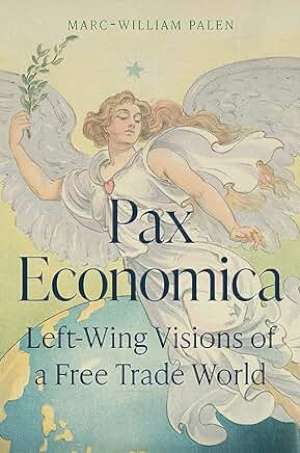03 July 2024
Pax Economica
Left‑Wing Visions of a Free Trade World
Marc-William Palen
2024, Princeton University Press, 328 pages,
ISBN 9780691199320
Reviewer: Maximilian Magnacca

This book is a welcome and interesting addition to the historiography on free trade as an idea and its surrounding political economy ranging from the mid-nineteenth century to the mid-twentieth century. It has been published during an interesting time in the global economy, as commentary on deglobalisation has increased, and economic liberalism is increasingly critiqued by those both on the right and the left. Palen aims with his work to bring to light and attention that free trade’s traditional home was amongst left-wing political leaders and the associated groups of pacificists, feminists, anti-colonialists, and globalists. This does slightly turn the discourse of the 2010s and early 2020s on its head as we’ve seen the rise of left-wing populists across the world, with Corbyn in the UK and Mélenchon in France being some names that come to mind, highlighting the ills that free trade had brought. Pax Economica was able to connect this current discourse with the past, and this made it a more enjoyable and thought-provoking read.
Focusing on the content of the book, whilst the survey nature of the book makes it broad enough to be approachable by the casual reader, at times the academic tone and listing of personalities, schools of thought, and political movements can make the chronology and, fundamentally, the text challenging to follow. This is particularly noticeable at the beginning of the book, probably because the author is attempting to set out the context for the rest of the book. Once past this initial stage, however, the book provides an interesting foil to the traditional historiography of the period as it highlights the role free trade held in the development of socialist thought, and wider social consciousness. Palen also demonstrated how the some of the big issues of the day, such as empire-building and non-settler colonialism, were built off the back of protectionist thought.
It’s interesting to note how free trade was viewed by left-wing political parties as a way of not only promoting world peace but guaranteeing it, as natural resources and markets would be available to trade for and with without fear of being cut off through the jingoistic policies of others (unlike what did actually come to pass). It’s also interesting to note how a theory similarto this (if not exactly the same) reappeared in the late 1990s and early 2000s as the ‘Golden Arches Theory’ i.e., the idea that no two countries with a McDonald’s would go to war as trade would be too advantageous to cut off. The theme of why this idea grew in fashion and then swiftly out of fashion in both time periods could have been further explored, with a possible explanation being the sense of security that societies felt amidst general prosperity. This addition could have made the book more relevant for those today who are worried about the retreat of economic liberalism.
In summary, the author should be applauded for his addition to the historiography and debate on the roots and supporters of free trade. His book has achieved its goal of incorporating socialists, pacifists, ‘radical’ liberals, and other left-wing movements as some of the original standard-bearers of free trade. Despite some challenging writing at times, the book is approachable and enjoyable to read. It adds a different view of the early twentieth century and also provides an interesting perspective to contemporary political discourse particularly as free trade is increasingly admonished. Those interested in economic history, political economy, and just refreshing perspectives should definitely read this book.
